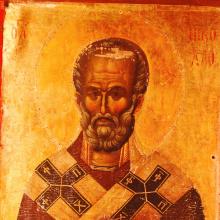myth
As Christians in an unjust world, it’s easy for us to long for escape, for a “pure, uncorrupted” place that makes sense to us — that is, our ideas of heaven. But while it’s important to desire that perfection, we ourselves can’t actually attain it, as true comprehension of heaven lies beyond earthly grasp. If getting to heaven is the only thing we care about, we’re missing the point.

Image via mythja/Shutterstock.com
When we think about the meeting of the first pilgrims and the Native Americans, we usually connect vicariously to one side of that old Plymouth encounter, mysteriously linking our faith journey to the early pilgrims’ faith journey. But what about those long-ago Native Americans? Is there a reason to remember them as more than a foil for the pilgrims?
Year after year we think warmly of that first union of the pilgrims and the Native Americans — and then we continue on in the supposed faith tradition of one of those peoples without another thought to the fate of the others.
So what role do those old Native Americans play in our faith today, and how might we bring them to mind or honor them? Here are a few ways you can faithfully honor both sides of the Thanksgiving table this year.
VIOLENCE is the ethos of our times. It is the spirituality of the modern world. What is generally overlooked is that violence is accorded the status of a religion, demanding from its devotees an absolute obedience-unto-death.
Its followers are not aware that the devotion they pay to violence is a form of religious piety, however. Violence is so successful as a myth precisely because it does not appear to be mythic in the least. Violence simply appears to be the nature of things. It is what works. It seems inevitable, the last and, often, the first resort in conflicts. It is embraced with equal alacrity by people on the Left and the Right, by religious liberals as well as religious conservatives.
A few weeks ago a well-meaning adult asked my youngest child, “What do you want Santa to bring you for Christmas?” She said, “Oh, I don’t believe in Santa.” I observed an uncomfortable silence, a nervous laugh, then came the question in that tone. “Why wouldn’t you teach your children about Santa? Don’t you like Santa?” Followed by: “Aren’t you concerned that they will ruin the fun for other children” and “Are you using some crazy psychological theory?” as well as “Your children must miss out on so much fun.”
Similarly a pastor friend encountered a strong reaction when he accidently revealed Santa to be a myth in a small group of Christian middle school students. A young girl became emotional and her parents were angry. Until that moment she had believed that Santa provided gifts for all children and her family had intentionally preserved that belief in service of imagination and wonder. I wonder if her parents were aware that had she grown up in a less financially comfortable situation, she would not have been a believer of Santa in middle school. That kind of “innocence” is available only to those with resources to isolate their children from the realities of the world.
I MET PASTORS Harvey, Alton, Charles, and Joel in Houston’s 5th Ward, a black neighborhood that in 1979 earned the title of “the most vicious quarter of Texas.” I was drawn there by a sermon I’d preached on Psalm 23 called “An experiment in crossing borders.” In it I asked my congregation, “What border is God leading you to cross? And who is waiting for you on the other side?”
Little did I know the profound impact that sermon would have on me.
Nearly five years later, I remember when these men stopped being “pastors at black churches on the other side of the 5th Ward border” and became “my people,” deeply connected as members of the body of Christ.
It was a moment of profound truth-telling, when I realized I was controlled more by the values of Western “racialized” culture than I was by the liberating gospel of Jesus and the alternative community to which I had given my life. It became clear to me that I’d affirmed myself and my identity through the lies of racial privilege, and done so at the expense of my brothers and sisters in Christ.
Michael Emerson, a sociologist from Rice University, provides us helpful language to understand how race works. Rather than analyzing racism (concretized for most of us through powerful images of slavery, hooded white supremacists, separate drinking fountains, and individual acts of hate), he invites us to analyze how our society is racialized.
IN MY MEMORY from nearly 50 years ago, the great pitcher Sandy Koufax is going against my Phillies in the old Connie Mack Stadium in Philadelphia. The records show that such a game occurred on June 4, 1964, the right year for my memory, so it is possibly correct. But I cannot prove I was there that day, nor can anyone prove I wasn’t. For me, it has entered the realm of myth—I may not actually have been there, but in my memory I believe I was. In a similar manner in religious experience, historical events originally recorded as perhaps inexact memories come to be believed as literal truths.
In Baseball as a Road to God, John Sexton uses the categories of the study of religion to explore the meaning of baseball. Sexton, president of New York University, has taught a popular seminar on this topic for more than 10 years, and in this book collects the essence of those classes.
For a baseball fan, the well-told stories of historic players, games, and seasons are by themselves worth reading and will evoke many memories. But rather than a random collection of stories, Sexton groups them in topics—sacred place and time, faith and doubt, conversion and miracles, blessings and curses, saints and sinners—illustrating each with fitting examples. Underlying it all, he proposes, are two words and concepts that link baseball and religion. Both illustrate the significance of the ineffable, “that which we know through experience rather than through study, that which ultimately is indescribable in words yet is palpable and real.” And both have moments of hierophany—a term devised by religious historian Mircea Eliade to signify “a moment of spiritual epiphany and connection to a transcendent plane,” a “manifestation of the sacred in ordinary life.”
ON THE AFTERNOON of Dec. 14, President Obama stood in the White House press room, tears in his eyes, and spoke for many Americans who had watched the terrifying events unfolding in Newtown, Conn.
“I know there’s not a parent in America who doesn’t feel the same overwhelming grief that I do. The majority of those who died today were children: beautiful little kids between the ages of 5 and 10 years old,” he said. “They had their entire lives ahead of them—birthdays, graduations, weddings, kids of their own.”
A little more than a month later, on Jan. 23, a pilotless aircraft owned and operated by the United States and controlled remotely by an individual on U.S. soil launched a targeted attack on the riders of two motorcycles in Yemen. The attack missed its target. It hit the house of Abdu Mohammed al-Jarrah instead, killing several people—including al-Jarrah’s two children.
There was no press conference for the al-Jarrah children.
It was President Obama himself, in fact, after his inauguration in 2009, who authorized an expansion of the U.S. drone program launched under George W. Bush. The “Authorization for Use of Military Force,” passed shortly after Sept. 11, gives the president broad authority to use force against those involved in the 9/11 attacks or those who harbor them. Drones have become President Obama’s weapon of choice.
THE CEO OF one of the world's most popular video-game manufacturers recently denied any relationship between his products (some of which have their users re-enact mass slaughter) and real killing. The substance of such denial appeared to some to be no more complex than "because I said so, and some other people agree with me." Meanwhile, in the immediate aftermath of the Aurora movie theater shootings last year, Hollywood producer Harvey Weinstein called for a summit of directors to discuss their imaginary guns. He later acknowledged that "I don't have the answers to these questions. ... They're so complicated; you need people with better facts and intelligence. In this situation I have to be a follower, not a leader." Refreshing humility from someone better known for bluster and self-assurance, now opening a door to a conversation on which lives may depend.
Film critics, too, have a responsibility to contribute to this conversation, so let me propose some ideas:
1. Portrayal and advocacy are not the same thing. The violence of Reservoir Dogs and Looper may be visceral, but it tells the truth about the suffering that guns and knives can inflict and may help people think twice about enacting real violence. The violence ofHome Alone andTransformers may be cartoonish, but it lies to the audience and may fuel appetites for further destruction.
2. The shape of the narrative arc may be more influential than any particular acts of violence. Our culture seems to be addicted to the idea that order can be brought out of chaos by ultimate force, that violence can literally "cleanse the world." This myth—this religion—shows up everywhere, not just in the movies. Indeed, it is a keystone of our politics. The best thing movies can do about it is to tell a different story.
Mitt Romney has an evangelical problem. Or so we’ve been told by everyone from The New Yorker to The Huffington Post to The Daily Beast. The national media have perpetuated this narrative throughout the election season, and political pundits aplenty have assumed its reliability in their columns and commentary.
But there’s one glaring problem with the storyline: It’s not true.
“Evangelicals say they want a presidential candidate who shares their religious beliefs and they still hold that Romney’s religion is different from their own,” says Robert Jones, CEO of the Washington-based Public Religion Research Institute. “And yet as early as May 2012, shortly after it became clear that Romney was the presumptive nominee,Romney held a 45-point lead over Obama" among evangelicals.
We’ve been told that evangelicals were so skeptical of Romney’s Mormon faith they might not be able to pull the lever for him in the voting booth. But according to Jones’ research, as more white evangelical voters have realized that he is Mormon, his favorability among them has actually risen.
Good and gracious God,
Today, like the rest of the world,
when I woke I wrapped myself in myths.
They are comfortable and warming in what can seem like such a cold world.
Yes, they are old and worn but they are familiar
and even the most fashion forward find comfort in this thread-worn garb.
They tell me that while it may not be fair
that 1,600 children die from hunger everyday,
I can do nothing about it.
They silence my own judgment of myself
when I put a quarter in the cup of a homeless man
as I walk on by the lack in his life
to live into the abundance of mine....
"If you tell a lie, it will be all over the country in a day or two. But if you tell the truth, it will take ten years to get there." ~ Eddie "Son" House
And the truth is what Jesus offered the people of his hometown in this tale from Mark's Gospel. Jesus offered his prophetic witness of truth-telling. He held up a mirror and showed them who they were. He held up a mirror and said to them, "The Kingdom of God is with you."
They were enraged that one of their own would do such a thing.
He was utterly astonished that the people who had raised him were incapable of facing their own truth.
He also knew that if they could not face the realities of their own complicated lives they would not be able to embrace the healing and forgiveness that God offered.
Jesus had the blues. He had the hometown blues.
So, rejected, he fled his hometown.
Then he sent his apostles out into the world proclaiming peace, healing the sick and the lame, and prepared to face the same rejection. People don't like to be reminded of the complications of real life. None of us like the feeling of being judged when the mirror is held up before us.
It’s tempting for us to scoff at Kris and Kim’s downfall, but the reality is that their marriage failed at least in part because of our society’s views of nuptial bliss. That makes us all implicitly responsible, and it encourages us all to do a better job of loving our neighbors well, not just on their wedding day but on all the days that follow.
We are looking for 1,000 pastors to debunk a myth based on the political assertion that government doesn't have any responsibility to poor people. The myth is that churches and charities alone could take care of the problems of poverty -- especially if we slashed people's taxes. Both this assertion and myth contradict the biblical imperative to hold societies and rulers responsible for how they treat the poor, and ignore the Christian tradition of holding governments accountable to those in need. Faith-based organizations and government have had effective and healthy partnerships, and ultimately, the assertion and myth have more to do with libertarian political ideology, than good theology.







